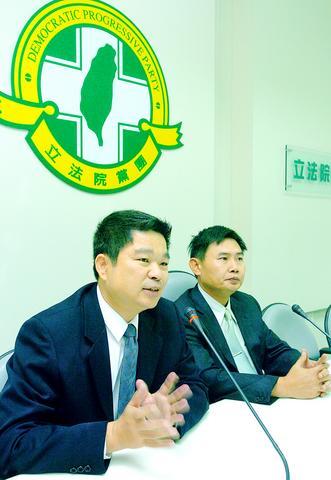Dispute over the constitutional amendment bill surfaced within the Democratic Progressive Party (DPP) yesterday as DPP Legislator Lin Cho-shui (林濁水) objected to halving the number of legislative seats, a move strongly supported by former DPP chairman Lin I-hsiung (林義雄).
Lin I-hsiung's Fourth Nuclear Power Plant Referendum Initiative Association also demanded that the DPP discipline Lin Cho-shui for ignoring a resolution issued by DPP headquarters.

PHOTO: WANG MIN-WEI, TAIPEI TIMES
The DPP legislative caucus yesterday said that discipline was not an issue at this point since the caucus had not reached a consensus on the bill, which is to be debated at a legislative sitting on Monday.
"The issue of discipline will only arise after the caucus has held a meeting and reached a consensus on [Monday], and a member then breaks the consensus and votes differently," DPP caucus whip Tsai Huang-liang (蔡煌瑯) said yesterday.
"The DPP caucus will support the party headquarters' resolution, and caucus leaders will talk to Lin [Cho-shui]," Tsai said.
While Lin I-hsiung and his anti-nuclear plant association have been pressuring the legislature to pass the bill, which halves the present 225 seats to 113 seats, Lin Cho-shui and other members of the DPP's New Tide faction have dismissed downsizing as a feasible solution for solving legislative unreliability.
They also said that adopting a "single-member, two-vote" electoral system would be preferable.
Lin Cho-shui was singled out by the association earlier this week as an obstacle to legislative reform. The association had criticized him for breaking the DPP headquarters resolution and demanded disciplinary action.
But Lin would not back down, citing academic opinion to support his stance.
"In public hearings on the constitutional amendment over the past two days, all of the academics were opposed to simply halving the seats ... and this was regardless of their political preferences," Lin Cho-shui said yesterday.
The legislature has been holding public hearings on constitutional amendments over the last three days at the request of the People First Party to gather opinions from legal and political experts.
"Additionally, with the current plan to halve the seats, it will be difficult for the DPP to win a majority. The current direction of constitutional amendment will be hurtful to the DPP," Lin Cho-shui said.
Lin Cho-shui also said that while he did sign an association petition for legislative downsizing before the presidential election in March, he did so reluctantly, and only out of consideration for President Chen Shui-bian's (
Two days ago Lin Cho-shui also urged Lin I-hsiung to reflect on his behavior.
"Even saints are not mistake-proof. I suggest Lin I-hsiung reflect on his actions and not act without wisdom," Lin Cho-shui said.
The remark was said to have angered Lin I-hsiung.
Association executive general Iap Phok-bun (葉博文) said: "Lin Cho-shui is talking nonsense. He tries to blame this on the president, so does that mean he is saying the president has been cheating voters?"

A preclearance service to facilitate entry for people traveling to select airports in Japan would be available from Thursday next week to Feb. 25 at Taiwan Taoyuan International Airport, Taoyuan International Airport Corp (TIAC) said on Tuesday. The service was first made available to Taiwanese travelers throughout the winter vacation of 2024 and during the Lunar New Year holiday. In addition to flights to the Japanese cities of Hakodate, Asahikawa, Akita, Sendai, Niigata, Okayama, Takamatsu, Kumamoto and Kagoshima, the service would be available to travelers to Kobe and Oita. The service can be accessed by passengers of 15 flight routes operated by

GIVE AND TAKE: Blood demand continues to rise each year, while fewer young donors are available due to the nation’s falling birthrate, a doctor said Blood donors can redeem points earned from donations to obtain limited edition Formosan black bear travel mugs, the Kaohsiung Blood Center said yesterday, as it announced a goal of stocking 20,000 units of blood prior to the Lunar New Year. The last month of the lunar year is National Blood Donation Month, when local centers seek to stockpile blood for use during the Lunar New Year holiday. The blood demand in southern Taiwan — including Tainan and Kaohsiung, as well as Chiayi, Pingtung, Penghu and Taitung counties — is about 2,000 units per day, the center said. The donation campaign aims to boost

ENHANCING EFFICIENCY: The apron can accommodate 16 airplanes overnight at Taoyuan airport while work on the third runway continues, the transport minister said A new temporary overnight parking apron at Taiwan Taoyuan International Airport is to start operating on Friday next week to boost operational efficiency while the third runway is being constructed, the Ministry of Transportation and Communications said yesterday. The apron — one of the crucial projects in the construction of the third runway — can accommodate 16 aircraft overnight at the nation’s largest international airport, Minister of Transportation and Communications Chen Shih-kai (陳世凱) told reporters while inspecting the new facility yesterday morning. Aside from providing the airport operator with greater flexibility in aircraft parking during the third runway construction,

American climber Alex Honnold is to attempt a free climb of Taipei 101 today at 9am, with traffic closures around the skyscraper. To accommodate the climb attempt and filming, the Taipei Department of Transportation said traffic controls would be enforced around the Taipei 101 area. If weather conditions delay the climb, the restrictions would be pushed back to tomorrow. Traffic controls would be in place today from 7am to 11am around the Taipei 101 area, the department said. Songzhi Road would be fully closed in both directions between Songlian Road and Xinyi Road Sec 5, it said, adding that bidirectional traffic controls would